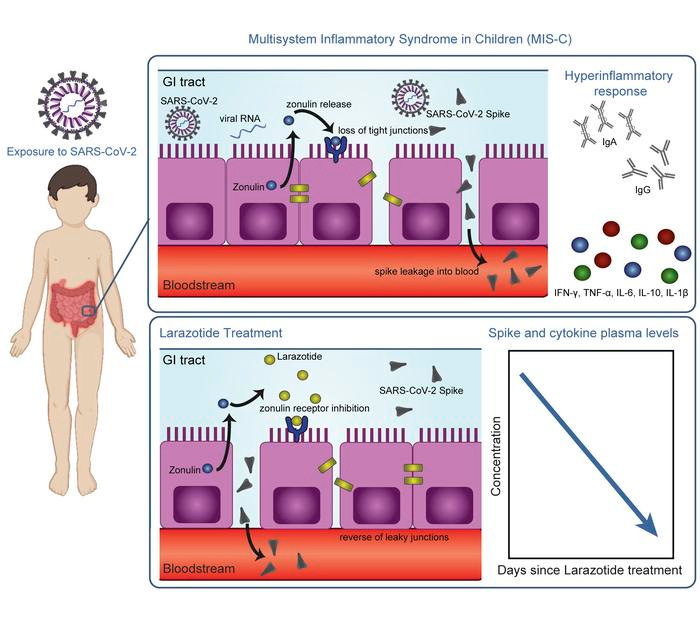A Life-Threatening Syndrome in Kids with Covid Is Growing. Now We May Know How to Treat It.
A mysterious inflammatory disease popped up in kids infected with Covid, but no one was sure how the virus was causing it. Now we may know what’s happening and how to treat it.
A mysterious inflammatory disease popped up in kids infected with Covid, but no one was sure how the virus was causing it. Although cases in the US were extremely uncommon in the early pandemic, we’re starting to see it more often. Now we may know what’s happening and how to treat it.
The life-threatening illness called Multisystem Inflammatory Syndrome in Children (MIS-C) often comes with GI symptoms. If the extreme inflammation continues that may spell trouble for the heart. This was all the more worrisome as it wasn’t clear how the virus was causing this syndrome and we couldn’t predict who would get it.
A study1 analyzed biospecimens, which is science-speak for poop, from 100 children, with 55 controls. Biospecimens were tested for the virus and plasma, which means the fluid, in the biospecimen was checked for signs that the lining of the gut had been hurt. One biomarker used to tell if the gut lining had been damaged was zonulin. A biomarker is a measurable substance that tells us something—in this case, the something it told us was whether the inflammation had injured the lining of the gut.
Ultimately, researchers found that when the virus stays in the gut for a prolonged period, in some cases, it’s hurting the gut lining. That triggers a release of the biomarker zonulin.
To assess the importance of the zonulin, researchers treated children with MIS-C with a drug that countered the zonulin—an anti-zonulin. Children who received treatment had lower levels of inflammatory markers and lower levels of the spike protein in the blood. The improvement in the children’s health was better than what can be achieved with current options, meaning this may improve survival in children who do develop this rare syndrome.
In the long-term, this finding may also benefit research into inflammation, immune disease, and the role that the gut environment plays in disease.
Further Reading on MIS-C:
What Parents Need to Know About Multi-system Inflammatory Syndrome in Children (MIS-C)
Multisystem inflammatory syndrome in children (MIS-C) and COVID-19, from the Mayo Clinic
From the CDC
What we know about MIS-C
Multisystem inflammatory syndrome in children (MIS-C) is a condition where different body parts can become inflamed, including the heart, lungs, kidneys, brain, skin, eyes, or gastrointestinal organs. We do not yet know what causes MIS-C. However, we know that many children with MIS-C had the virus that causes COVID-19, or had been around someone with COVID-19. MIS-C can be serious, even deadly, but most children who were diagnosed with this condition have gotten better with medical care.
What to do if you think your child is sick with MIS-C
Contact your child’s doctor, nurse, or clinic right away if your child is showing symptoms of MIS-C:
Fever
Abdominal pain
Vomiting
Diarrhea
Neck pain
Rash
Bloodshot eyes
Feeling extra tired
Be aware that not all children will have all the same symptoms.
Seek emergency care right away if your child is showing any of these emergency warning signs of MIS-C or other concerning signs:
Trouble breathing
Pain or pressure in the chest that does not go away
New confusion
Inability to wake or stay awake
Pale, gray, or blue-colored skin, lips, or nail beds, depending on skin tone
Severe abdominal pain
How doctors will care for your child
Doctors may do certain tests to look for inflammation or other signs of disease. These tests might include:
Blood tests
Chest x-ray
Heart ultrasound (echocardiogram)
Abdominal ultrasound
Doctors may provide supportive care for symptoms (medicine and/or fluids to make your child feel better) and may use various medicines to treat inflammation. Most children who become ill with MIS-C will need to be treated in the hospital. Some will need to be treated in the pediatric intensive care unit (ICU).
Parents or caregivers who have concerns about their child’s health, including concerns about COVID-19 or MIS-C, should call a pediatrician or other healthcare provider immediately. Healthcare providers can follow CDC recommendations to keep children and their parents or caregivers safe if an in-person visit is needed.
What we don’t know about MIS-C
CDC is still learning about MIS-C and how it affects children, so we don’t know why some children have gotten sick with MIS-C and others have not. We also do not know if children with certain health conditions are more likely to get MIS-C. These are among the many questions CDC is working to try to understand.
All CDC recommendations are based on the best data and science available at the time, and we will update them as we learn more.
How to protect your child from COVID-19
Based on what we know now about MIS-C, the best way you can protect your child is by taking everyday actions to prevent your child and the entire household from getting the virus that causes COVID-19.
Related Pages
Yonker, L. M., Gilboa, T., Ogata, A. F., Senussi, Y., Lazarovits, R., Boribong, B. P., Bartsch, Y. C., Loiselle, M., Rivas, M. N., Porritt, R. A., Lima, R., Davis, J. P., Farkas, E. J., Burns, M. D., Young, N., Mahajan, V. S., Hajizadeh, S., Lopez, X. I. H., Kreuzer, J., … Fasano, A. (2021, May 25). Multisystem inflammatory syndrome in children is driven by zonulin-dependent loss of gut mucosal barrier. The Journal of Clinical Investigation. https://www.jci.org/articles/view/149633.





